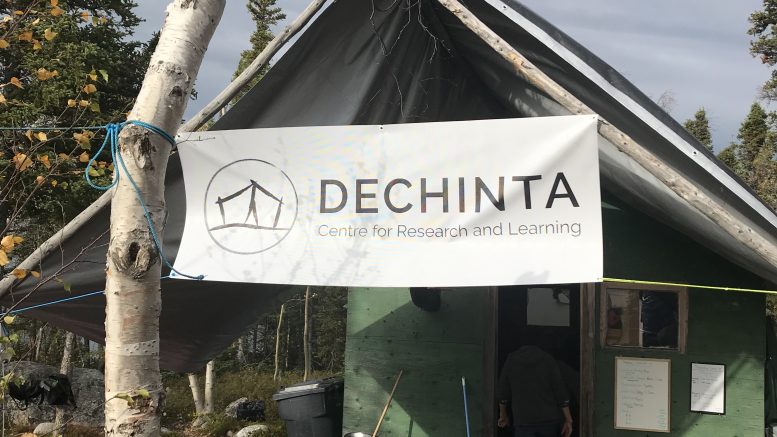Kristen Tanche attributes her time at the Dechinta Centre with developing her professional career involving land-based programming.
“I was able to go back to the land where my forefathers and ancestors had frequented,” she says. “That wasn’t something that I had ever done before.”
Shortly after finishing her third program with the Dechinta Centre, Tanche got a job coordinating regional on-the-land programs in the Dehcho First Nations.
She says she continues to work with the learning institution, but a lot of plans have been derailed as a result of COVID-19.
However, a new partnership between the Dechinta Centre and the Mastercard Foundation, ensures there will be more programming in the future.
The Mastercard Foundation, has committed $240,685 to provide funding to the Dechinta Centre to respond to the needs of northern Indigenous communities.
Some of the initiatives the funding will go towards includes food security research, instructional videos, mentorship and language programs with the Tu Łidlini Dena, Yellowknives Dene and Dehcho First Nations.
The programming will involve COVID-19 resiliency education and create employment opportunities within the communities.
“They [the Mastercard Foundation] have really risen up to the call for a lot of non-profits across the North,” says Dr. Kelsey Wrightson, executive director at the Dechinta Centre.

One of the many components of the Dechinta Centre programming. (Photo courtesy of Kelsey Wrightson.)
Online learning in land-based education
The Dechinta Centre is a learning institution that offers a curriculum through land-based Indigenous-led education and research.
“The core of our program is learning from the land, learning the lessons that each different landscape and community needs to teach us,” Wrightson says.

Photo courtesy of Kelsey Wrightson.
One way COVID-19 is affecting education is by creating a reliance on online learning — the Dechinta Centre is no exception.
Wrightson says webinars have become a recent component to the Dechinta Centre’s teaching and with it comes new opportunities.
“The webinars have actually been a very interesting process,” she says. “Because on one hand we’ve been able to bring together educators from many different nations.”
However, she recognizes the challenges involved in using this service as access to high speed internet across the North is not a reality for many.
“It’s something we’re very aware of for our fall program and for future programs,” she says. “How to make sure that any sort of transition to online is accessible to every single person who wants to participate in the program.”

The Dechinta Centre has received funding through a partnership with the Mastercard Foundation. (Photo courtesy of Kelsey Wrightson.)
Recovery from the pandemic
Wrightson says the funding is vital to helping communities recover from the global pandemic while providing education and employment opportunities.
Tanche, now a health and wellness coordinator at Dehcho First Nations, says she continues to work with the Dechinta Centre through land-based training programs.
She adds the funding provided through the Mastercard Foundation will directly help the Dehcho First Nations as they hope to put together a language resource program.
“I think that what Dechinta really brings is they have a lot of expertise and on-the-land programming and working with elders,” Tanche says.
She adds the Dechinta Centre always asks what it is the Dehcho First Nations wants accomplished and helps them achieve these objectives.
“We need more of that,” Tanche finishes.
Luke Carroll is a journalist originally from Brockville, Ont. He has previously worked as a reporter and editor in Ottawa, Halifax and New Brunswick. Luke is a graduate of Carleton University's bachelor of journalism program. If you have a story idea, feel free to send him an email at luke.carroll@cklbradio.com





